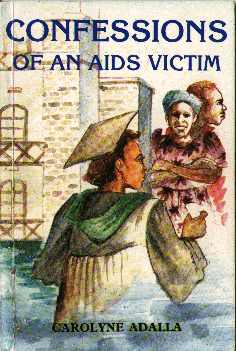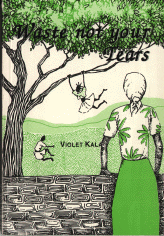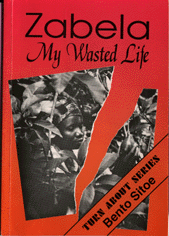
Vol.1. no 3. 1997.
https://www.arts.uwa.edu.au/MotsPluriels/MP3974li.html
In spite of the fact that the four books mentioned below represent only modest literary achievements, they provide first hand perception of HIV/AIDS in different parts of Africa.
Carolyne Adalla's Confessions of an AIDS victim comes from Kenya. The story reads well, although strong didactic intentions on the part of the narrator are somewhat overbearing.
Written by a HIV+ young woman, Waste not your tears is a poignant, in some ways disheartening, but also a sympathetic treatment of the subject.
Although very short, Bento Sitoe's life story Zabela, my wasted life shows how easy it is for young teenagers to end up working as prostitutes in Mozambique and how little protection young women have against HIV/AIDS.
It is difficult to recommend the reading of Koné Doh Fandanh's Le Défilé des innocents because of the narrator's sexist attitude and the weakness of the plot. Yet the fact that a young man of the Ivory Coast, aged only twenty, chooses to write on HIV/AIDS, seems to indicate the importance of the issue for young African people of today. Rather than minimising Koné Doh Fandanh's achievement, I would hope that adequate working conditions will return to African universities and with them much better opportunities for students to discuss critical contemporary issues including sexism and HIV/AIDS. This alone can bring about real changes for the betterment of all.
 |  Carolyne Adalla. Confessions of an AIDS victim. Nairobi: Spear Books, 1993. 84p. ISBN 9966-46-846-3.
Catherine Njeri, a beautiful, young and intelligent woman, learns with shock and utter disbelief that she is HIV positive which makes her an AIDS victim. This means many things to her; she cannot go ahead with her plans to study for her masters degree in the USA and she has to start thinking like somebody who is at the end of her life.
Carolyne Adalla was born in Kenya.
|
 |  Violet Kala. Waste not your tears. Harare: Baobab Books, 1994. 73p. ISBN 0-908311-64-8.
Loveness, young and naive, thinks she has found the man of her dreams in Roderick. She allows herself to be seduced, seeing this as a proof of his love. His promise of marriage disappears at the same time as she moves into his quarters. Roderick, however, is not quite what he appears and he certainly isn't anything Loveness expected or wanted. Roderick has AIDS. |
 |  Bento Sitoe (Translated from the Tsonga by Renato Matusse). Zabela: my wasted life. Harare (PO Box 567): Baobab Books, 1996, 44p. ISBN 0-908311-84-2.
Zabela is the sad story of a young woman who finds herself trapped into prostitution through naivete and poverty. Driven by shame from rural Mozambique into the city, Zabela finds herself dependent for survival on the women who run the brothels; and on men who know how to take advantage of her ignorance and despair.
The setting is Mozambique, but the experience is one which will move and echo in the hearts and minds of women everywhere.
Simply and movingly written, the story is told by Zabela herself, in a voice that comes from the heart and resonates with the honesty of an experience that has been lived through, an experience which needs to be shared. (From back cover)
|
 Koné Joël Doh Fandanh. Le Défilé des innocents. Abidjan: Edilis, 1996. 88p. ISBN 2-909238-46-6
Following the suicide of his friend Sly, Eric decides to get tested for AIDS and learns that he is HIV+. This news triggers memories. The script of his own life moves slowly in front of his eyes. Eric remembers his first encounter with Sly, their life in the Cité Universitaire, his own shyness towards women and Sly's numerous conquests, his first sexual experience with one of Sly's girlfriends, the disastrous effect of the news he is HIV+ on his morale, his life and that of his family.
Two stories run in parallel: that of Eric which starts when he learns he is HIV+ and that of Sly whose short and devastating life leads him to HIV/AIDS and suicide.
|
Back to [the top of the page] [the contents of this issue of MOTS PLURIELS]